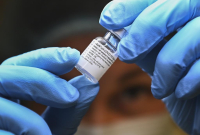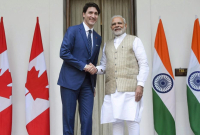Support strong Canadian climate journalism for 2025
The vast majority of Canadians blame Ottawa rather than provincial governments for delays in COVID-19 vaccine delivery, a new poll suggests.
Sixty-nine per cent of respondents believe Canada is behind on deliveries due to federal challenges obtaining doses on the global market, according to an online survey by Léger and the Association for Canadian Studies.
Only 14 per cent of respondents point the finger at provincial governments.
Prime Minister Justin Trudeau says all Canadians who want a dose will get one by the end of September, despite recent hiccups in the production of both the Pfizer and Moderna vaccines.
Residents remain divided on whether they will be able to roll up their sleeves before October, with 44 per cent confident they will and 51 per cent skeptical.
The split suggests Canadians maintain a measure of faith in the Liberal government's procurement efforts, said Léger executive vice-president Christian Bourque.
“People haven't given up hope that we will get there, but they’re certainly looking for answers," he said.
Canada sits well below the top of the heap in vaccine doses administered per 100 people, ranking 17th out of two dozen large countries — well behind Romania and just ahead of China and Russia — according to one list.
"A lot of what we hear is that Canada is falling behind. When people hear that, they automatically think it’s got to be something going on in Ottawa more than in my province," Bourque said.
Pfizer-BioNTech cut Canada's deliveries by more than two-thirds over four weeks while a production site in Belgium was expanded, though shipments are mounting again as the month progresses.
Moderna also shorted Canada on expected doses at the start of February — the company attributed the problem to a slower-than-expected production ramp-up at its Swiss manufacturing partner Lonza — and will deliver only two-thirds of the initially planned drop during its next shipment on Feb. 22.
Just one in five survey respondents said Ottawa should look to approve vaccines developed in Russia and China even if further delays trip up the rollout at home.
Germany became an unlikely backer of Russia's Sputnik V vaccine earlier this month, with German Chancellor Angela Merkel saying she would consider distributing it and providing production sites to speed up the European Union's inoculation drive.
"It seems to be gaining some momentum or public favour, but for some reasons Canadians, they’re shying away from it," Bourque said of the Sputnik jab.
The proportion of respondents who intend to get shots when a vaccine becomes available to them continues to grow, hitting 73 per cent versus 63 per cent in mid-October.
"So the intention is there," Bourque said.
"But again, it’s just a question of supply."
Conducted Feb. 12 to 14, the online poll surveyed 1,535 Canadians. It cannot be assigned a margin of error because internet-based polls are not considered random samples.
This report by The Canadian Press was first published Feb. 16, 2021.





Comments